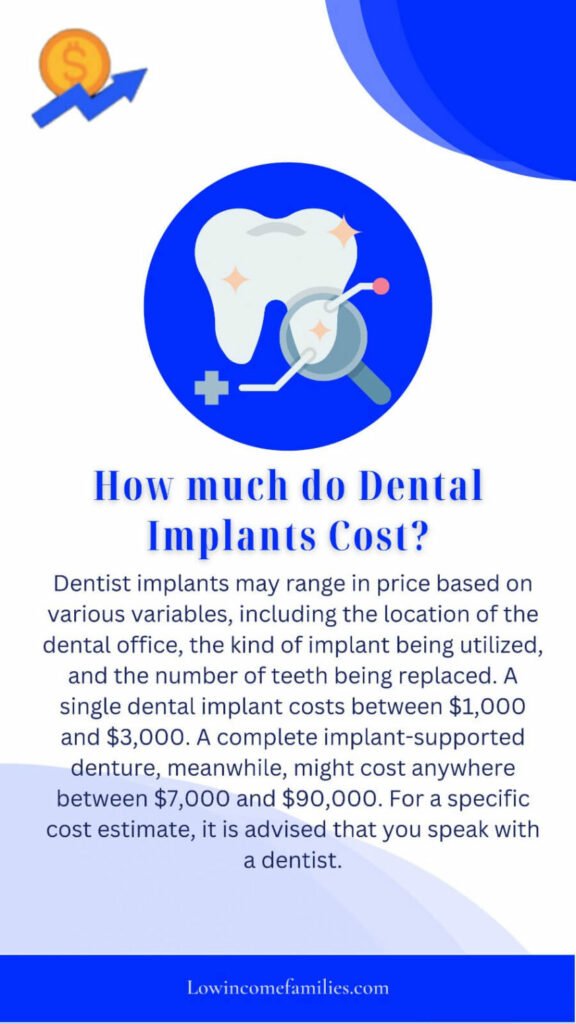Dental implants may be expensive, despite their advantages, and many individuals are reluctant to have them because they believe their insurance won’t cover the expense. If you’re wondering how to get dental implants covered by insurance, you’re at the right place.
Dental implants are an increasingly common and successful method of replacing lost or damaged teeth. They provide a long-lasting fix that may enhance the look of your smile and enable you to talk and chew once again.
In this blog article, we will outline what are the necessary claims you have to consider and the most important steps on how to get dental implants covered by insurance.
What Is A Dental Implant?
Dental implants act as the new tooth’s root by surgically inserting tiny metal posts into the jawbone. They are often constructed of titanium, a biocompatible substance that fuses with the surrounding bone to provide a sturdy base for a replacement tooth. The replacement tooth—typically a crown, bridge, or denture—is fastened to the implant. Since they can be costly, it is essential to consider to get dental implants covered by insurance.
Dental implants provide many advantages, such as:
- Enhanced Appearance :- Dental implants are a cosmetic option that may enhance the appearance of your smile since they feel and look like real teeth.
- Improved Function :- Dental implants may help you consume a wider range of foods and talk effectively by restoring your ability to chew and communicate.
- Durability :- Dental implants are designed to be a long-term solution and, with correct maintenance, may endure for many years.
- Convenience :- Dental implants don’t need to be cleaned or maintained uniquely as removable dentures do.
Due to its many advantages, dental implants are frequently a preferred option among patients and dentists. However, they may be expensive procedures, which is why many believe their insurance will not cover the expense. However, if you know dental implants covered by insurance, as we shall show in this blog article, insurance coverage for dental implants cost is conceivable.
How To Get Dental Implants Covered By Insurance?
Do you have thoughts such as “I need dental work but I have no money”? Well, you’re not the only one. It’s possible to have dental insurance that covers implants immediately. How? Below are the steps to claim yours:
Step 1 :- Understanding Your Dental Implant Insurance
When trying to obtain dental implants covered by insurance, it’s essential to understand your insurance policy. Whether you want to know if dental implants are a cost covered by your insurance plan, review your coverage and understand what is and is not covered.
Keep the following in mind when you check your insurance policy before checking dental implants covered by insurance:
- Your Policy’s Constraints :- There may be limitations on the amount of dental care coverage allowed by your insurance policy.
- Deductibles You Have :- The amount you must pay out of pocket before your insurance coverage begins is a deductible.
- Your Coinsurance :- Co-insurance is the portion of a treatment’s cost you are still liable for after your deductible has been satisfied.
- Your Maximum Out-Of-Pocket Expense :- This is the most you will ever have to pay out of pocket for approved costs in a calendar year.
Types Of Dental Insurance Plans Available And Their Coverage Of Dental Implants
Are dental implants covered by insurance? Absolutely! Dental insurance plans come in various forms, and each has specific standards and coverage for dental implants. The most popular kinds of dental insurance policies and their dental implant coverage are briefly described below:
- Traditional Indemnity Policies :-
These policies let you choose your dentist and often pay for a percentage of dental implants’ price. Depending on the plan and the individual’s coverage, there will be differences in coverage and out-of-pocket expenses.
- Preferred Provider Organizations (PPOs) :-
PPOs often provide a provider network from which you may choose. Dental implants are still covered, albeit they frequently give greater coverage for in-network than for out-of-network providers.
- Health Maintenance Organizations (HMOs) :-
HMOs sometimes have a narrower provider network and may impose greater limitations on dental implant coverage. It’s crucial to confirm with your HMO plan if dental implants are covered and what the conditions are.
- Discount Dental Plans :-
Do you wonder how much do veneers cost with insurance? Veneers range in price from $925 to $2,500 per tooth in insurance. Depending on the policy, veneers may be fully or partially covered by insurance plans such as discount dental plans. Although these plans normally do not give direct coverage, they offer decreased prices for dental procedures, including dental implants.
- Dental Savings Plans :-
Although no insurance coverage exists, these plans give a predetermined sum of money for certain operations, such as dental implants.
Check Also: How To Get Antidepressants Without Insurance ?
Step 2 :- Determine If Your Insurance Covers Dental Implants
Here are some pointers for determining does dental insurance pay for implants :-
- Examine Your Insurance Contract:- Examine your insurance policy thoroughly to determine what is and is not covered. Pay close attention to your deductibles, coinsurance, out-of-pocket maximums, and coverage restrictions.
- Speak With Your Insurance Company:- Ask your insurance company what insurance covers dental plans when you contact them. Ask about any conditions or standards that must be satisfied for coverage to be offered.
- Ask Your Dentist:- Your dentist could have expertise dealing with your insurance company and be able to provide you with information about how to get dental implants covered by insurance.
- Check For Exclusions:- Certain procedures, such as dental implants, may be excluded from coverage under certain insurance policies. Make sure to verify your coverage for any dental implant-related exclusions.
- Alternative Financing Options:- Dental savings programs, dental loans, or health care credit cards should be considered if your insurance policy does not cover dental implants.
- Obtain A Pre-Authorization:- Before moving forward with the dental implant process, you may ask your dentist or insurance company to do so. This will guarantee that you have the necessary coverage before the treatment.
- Keep All The Paperwork:- Keep copies of any paperwork and records of communications with your insurance company and dentist. It will be useful in dental implants covered by insurance if there are any disagreements or appeals.
Paying attention to these suggestions may improve your chances of approval on how to get dental implants covered by insurance. It’s vital to study your policy and get in touch with your insurance provider to understand the details of your coverage since every insurance plan is unique.
Step 3 :- Determine Your Insurance Eligibility
Does medical cover dental implants? Yes, but it depends on your insurance eligibility. Insurance companies evaluate whether to pay for dental implants based on criteria. These standards might include the following:
- Medical Necessity:- Dental implants could be covered if they are determined to be medically essential. When establishing medical necessity, insurance companies may consider elements including the condition of the patient’s jawbone, their capacity to chew and talk normally, and their general oral health.
- Waiting Periods:- Before providing coverage for dental implants, several insurance plans may impose waiting periods. This implies that before you are qualified for coverage, you may need to be registered in the plan for a certain time.
- Maximum Lifetime Benefits:- Dental procedures, including dental implants, may be subject to maximum lifetime benefits under certain insurance policies. This indicates a lifetime limit on the amount of money your insurance provider will cover for dental implants cost with insurance.
- Alternatives:- Some insurance companies may ask patients to consider less expensive alternatives like bridges or dentures before paying for dental implants.
- Pre-Existing Conditions:- For individuals with pre-existing problems, including periodontal disease or jawbone degradation, certain insurance companies may not pay the cost of dental implants.
- Age:- Dental implant coverage may be subject to age limits imposed by certain insurance providers.
What about emergency dental no insurance no money? Insurance is there for you at minimal rates. However, it’s crucial to remember that each insurance plan is unique and that various standards may be used when determining eligibility for coverage. It is advised to study your insurance contract and/or get in touch with your insurer to learn more about how to get dental implants covered by insurance.
Step 4 :- Gather Necessary Documentation
The next step for how to get dental implants covered by insurance is gathering all mandatory documentation. Getting your insurance to pay for dental implants is a process that starts with gathering the proper paperwork. Insurance companies often need the following forms of paperwork before approving coverage:
- Dental Exam And X-rays:- To assess the state of your jawbone and dental health, your dentist will need to conduct a comprehensive examination and take X-rays. Your insurance provider will use this information to decide if dental implants are medically essential.
- Treatment Strategy:- You’ll need a thorough treatment strategy from your dentist that includes information on the cost of the operation, the number of implants needed, and any potential extra procedures.
- Medical History:- Your insurance provider could ask for details about your medical background, including any current health issues or prescription drugs you use.
-
- Ensure you have a copy of your insurance card and other necessary documentation as proof of coverage.
- A general dentist’s recommendation (if required by your insurance provider).
- Preapproval from your insurance provider (if required).
Step 5:- Submitting Your Claim
Though submitting your claim to your insurance provider for how to get dental implants covered by insurance might be difficult, however by following these instructions, you can improve your chances of success:
- Assemble The Required Paperwork:- Make sure you have all the essential paperwork, such as a copy of your insurance card, a thorough treatment plan, and any other data your insurance provider may want.
- Fill Out The Claim Form:- Complete and correctly complete the claim form. Ensure everything is proper and all essential fields are filled out by checking twice.
- Documentation And Claim Form Submission:- Send your insurance company the claim form and any required supporting documents. By the preferences of your insurance provider, you may submit the claim form and supporting documents in person, by mail, or online.
- Keep A Copy Of The Claim Form And Any Supporting Documents:- Maintain records of your submission. Keep a record of the date you filed the claim and the name of the insurance company representative you talked with.
Step 6:- Follow Up On Your Claim
A crucial step in how to get dental implants covered by insurance is to follow up on the claim for approval. The following advice can help you verify your claim:
- Check the progress of your claim by getting in touch with your insurance provider. Verify if they have all the required paperwork and whether they need any further information.
- Ask about the time frame: Find the anticipated time frame for processing your claim from your insurance company. Ask whether there are any deadlines for providing further information or filing an appeal for a claim denial.
- Keep track of all communications with your insurance provider, noting the date, time, and name of each individual you interacted with. This will make it easier for you to monitor your claim and ensure that nothing is overlooked.
- Consider appealing: If your claim is rejected, you may have the right to do so. Make sure to enquire with your insurance company about the requirements and appeal procedure for a claim denial, as this hinders your process of how to get dental implants covered by insurance.
- Seek professional assistance: If you are having trouble processing your claim, consider receiving support from a patient navigator or a health care advocate. They can assist you in comprehending the procedure and navigating the claims and appeals processes.
How Much Do Dental Implants Cost?
Depending on the precise coverage provided by your plan, dental implants with insurance will cost more or less. Certain insurance policies could partially cover dental implants, but they might not be at all. It’s crucial to confirm with your insurance company what is covered by your policy.

Your insurance plan may cover dental implants. However, the amount of coverage is based on the plan’s yearly maximum benefit and the proportion of treatments covered. For example, if you wonder how much does a dental crown cost without insurance, the price of a dental crown may range from $500 to $3,000, depending on the kind of crown and the location of the dentist’s office.
Otherwise, several other doubts that people have are how much does a dental bridge cost without insurance. The cost of the abutment and crown, which are affixed on top of the implant to keep the replacement tooth in place, and a part of the cost of the implant operation, are often covered by insurance policies.
Dentist implants may range in price based on various variables, including the location of the dental office, the kind of implant being utilized, and the number of teeth being replaced. A single dental implant costs between $1,000 and $3,000. A complete implant-supported denture, meanwhile, might cost anywhere between $7,000 and $90,000. For a specific cost estimate, it is advised that you speak with a dentist.
Conclusion:-
Obtaining insurance coverage for how to get dental implants covered by medical insurance may be a difficult procedure. However, you can improve your chances of success by evaluating your insurance policy, compiling the required paperwork, and doing the above actions. To ensure you have all the information you want, it’s crucial to understand the standards your insurance provider uses to evaluate eligibility for coverage. You should also speak with your dentist and insurance provider.
Don’t be afraid to seek further help if you’re having trouble on to get dental implants covered by insurance. Think about speaking with a patient navigator or healthcare advocate to assist you through the process. For assistance with any appeals or disputes, you may also contact the insurance department in your state.
Frequently Asked Questions
How much do single-tooth implants with insurance cost?
When covered by insurance, a single-tooth implant generally costs between $1,500 and $6,000. However, the price of a single implant with insurance might change depending on the kind of insurance plan and the exact dental implant coverage.
What are some prevalent myths regarding dental implant insurance coverage?
A few widespread myths include that all insurance policies cover dental implants, all policies’ coverage is uniform, and the entire procedure’s cost is covered. Dental implants, however, are regarded as elective treatments and are not always covered by insurance policies; even when they are, the level of coverage varies from plan to plan.
How can I find out whether dental implants are covered by my insurance?
You should study your insurance coverage and get in touch with your insurance provider to find out whether your insurance policy covers dental implants. If you fulfill the requirements, they may explain what has to be done in order to give coverage.
How can I find out whether I qualify for dental implants coverage?
The best way to find out is to research the standards employed by your insurance provider and speak with your dentist in order to ascertain your eligibility for coverage for dental implants. Additionally, you should compile the required paperwork, such as a dental exam and X-rays, a thorough treatment plan, and a medical history.
If dental implants cannot be covered by insurance, what other funding alternatives are there?
Dental loans, health care credit cards, dental savings programs, dental finance firms, and retirement savings are a few additional funding choices. In rare circumstances, crowdfunding is also a viable choice. It’s crucial to keep in mind that these financing choices could have extra charges like interest or fees, therefore it’s advised to examine the prices and conditions of several options before choosing one.












